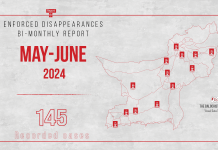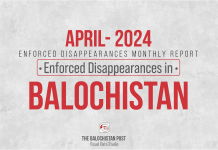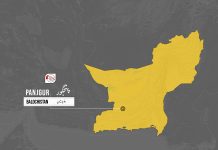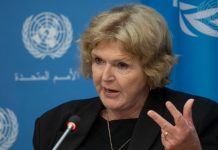The Voice for Baloch Missing Persons’ historical protest reached a 4000-day hallmark on 25 June. To mark this seemingly unreachable milestone, The Balochistan Post has decided to publish a 3-part report to retrace its background, recount its development and analyze its achievements. This is the Part-I of the endeavour that will attempt to provide the historical background of the VBMP’s 11-year long protest and survey the underlying causes that led to it.
Since the “forceful annexation” in March 1948, Balochistan has been subjected to interminable inhumane suppression. Against the wishes of its inhabitants, Pakistani state has been blamed to use Balochistan as launchpad for its proxy wars in the region, as an ownerless land to execute its nuclear tests, as a geostrategic site to bolster its rosy illusions of a soaring economy and has treated it like a Cockaigne meant to be plundered. The mineral-rich Balochistan has been feeding impecunious Pakistan for decades now – through Coal, Marble, Iron, Copper, Gold, and Natural Gas. But critics argue that Pakistan has reciprocated for millions of dollars’ worth of resources only through cruelty and negligence. This unappreciative response of the Pakistani state has stimulated five episodes of insurgency that have led to the loss of thousands of lives and have morphed Balochistan into a terrible bloodbath. Thousands of sons of the Baloch soil have been killed and dumped into mass graves or thrown away at deserted locations. The sole breadwinners of countless other Baloch families have been abducted and are kept in confinement to this day.
These outrageous circumstances led to the creation of Voice for Baloch Missing Persons, a rights organisation campaigning to cease the enforced disappearances in Balochistan and for the recovery of the already missing persons.
Formally, the VBMP was founded in October 2009, but its affiliates had been vocalizing against the human rights abuses since 2000, when Ali Asghar Bangulzai, a tailor by profession, was temporarily detained by the paramilitary forces. He was released after a 14-day confinement but was again abducted in 2001 in Quetta; 19 years later, his condition and whereabouts remain unknown. This incident prompted Bangulzai’s nephew, Nasrullah Baloch, to raise voices against enforced disappearances in Balochistan.
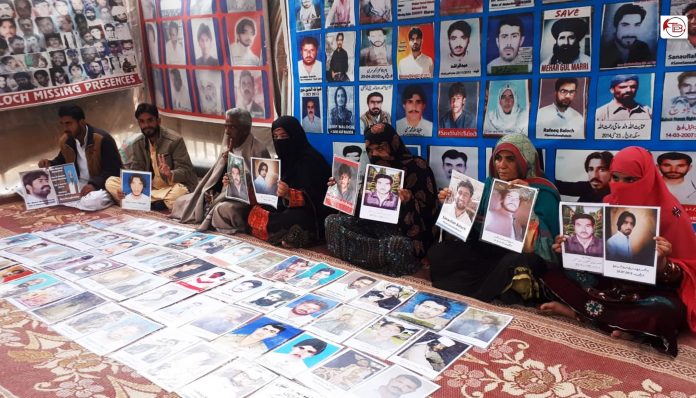
In 2009, Zakir Majeed, a student-leader and the then General Secretary of Baloch Student Organization Azad, was abducted from Mastung. His sister Farzana Majeed and his mother have been protesting for his safe recovery ever since, but to no avail. After 11 years, Majeed is nowhere to be seen or heard.
Jalil Ahmad Rekhi, the then Information Secretary of Baloch Republican Party and son of Mama Qadeer Baloch, was abducted in 2009 from Quetta. Along with a few other suffering families, Qadeer organized a protest in Quetta to question the unjustified abduction of his son and to make the cries of the victimized families heard. The intelligence services of Pakistan – ISI and MI – sent word to Qadeer through Samad Badini, son of the former Senator Waleem Muhammad Badini, demanding 2 million rupees in ransom for the release of Jalil Rekhi. When Qadeer refused, the intelligence agency stooped to threats – either to abandon the protestor to receive the dead body of his son. Qadeer refused and resultantly, Rekhi’s disfigured, bruised, tortured and cauterized body was found near Iran border in 2011.
These three incidents compelled Nasrullah Baloch, Mama Qadeer Baloch and Farzana Majeed – the most active voices of the VBMP – to initiate a peaceful protest against enforced disappearances and for the retrieval of the Baloch missing persons in 2009. A makeshift tent was pitched in front of the Quetta Press Club that stands to this day and shelters the families of the Baloch missing persons. That day, the ulterior resistance against state atrocities transformed into an open peaceful protest.
An indefinite protest was employed as a last resort. Despite the warnings from United Nations’ fact-finding missions, requests and recommendations from international and national human rights organizations, disapproval of the USA and European parliamentarians and incessant taunts by its archrival India, Pakistan did not take any long-term measure to curb the enforced disappearances.
Talking to a conference in Islamabad after a 10-day long mission to Pakistan in 2012, the UN delegation confirmed that thousands of persons are missing from Balochistan. The UN officials said that enforced disappearances cannot be allowed in any circumstances. “According to the 1992 Declaration for Protection of All Persons against Enforced Disappearances, no circumstances whatsoever, whether a threat of war, a state of war, internal political instability or any other public emergency, may be invoked to justify enforced disappearances,” the delegation said. Pakistan’s culpability was exposed when the country’s top institutions – the Supreme Court and the Military Establishment – refused to meet the fact-finding mission. Instead of taking heed of the UN’s recommendations and resolving the aforesaid issues, the Pakistani politicians criticized their visit, citing that their presence was the “violation of the country’s sovereignty.”
Time and again, the Amnesty International has condemned the enforced disappearances in Balochistan and requested the government to take immediate action. In countless reports and press releases, the UK-based human rights organization has recommended amendments in the belligerent policies of the Pakistani state in Balochistan and recommended amendments in the military strategies. So far, almost none of their recommendations has materialized.
The Human Rights Watch termed the enforced disappearances in Balochistan of ‘Epidemic proportions’ in 2011 and urged the government to take the necessary measures to curb the disappearances. HRW conceded that the Pakistani paramilitary forces and the intelligence agencies are selectively hunting down the alleged separatists and militants based solely on ‘suspicion.’ The New York-based rights organization had conducted interviews with almost a hundred families of the missing persons and the victims. Afterwards, it termed enforced disappearances as a ‘distinctive feature’ of Balochistan and concluded that paramilitary forces are the perpetrators.
World powers have expressed similar concerns on the inhumane conditions in Balochistan. A 2010 US State Department alleged that Pakistan abducts ‘suspected separatists’ from Balochistan, confines them, tortures them and eventually kills them. The report said that there has been ‘little progress’ on the human rights abuses in Balochistan. Members of the European Parliament also raised the issue in an article and said that people of Balochistan are victims of violence and “are being systematically targeted by paramilitary groups, allegedly sponsored by the Pakistani authorities.”
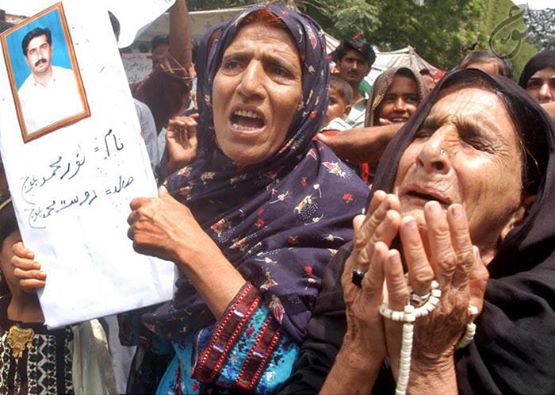
In an all-party meeting in Delhi, the Indian Prime Minister Narendra Modi addressed Balochistan’s plight and said that Pakistan “shall have to answer to the world for the atrocities committed by it against people in Baluchistan.” In the 33rd session of the United Nations Human Rights Council, Modi raised the issue of human rights abuses in Balochistan and said that: “The people of Balochistan, amongst other provinces, have been waging for decades a bitter and brave struggle against their daily abuse and torture.” The former Afghan President Hamid Karzai endorsed India’s stance on Balochistan and said that violence is encouraged in Balochistan by state-structures. Karzai said they the victims’ concerns need to “addressed and aired.”
Despite all these warnings by the UN, USA, European Parliamentarians and Human Rights Organizations, thr state has continued its ceaseless atrocities in Balochistan. Among these circumstances, a few people resolved to create an organization to attract international attention and put forth the plight of Baloch people before a global audience. Thus, Voice for Baloch Missing Persons was founded in 2009, and four years later, in 2013, it carried out a historical march from Quetta to Islamabad.
[Continued.]


